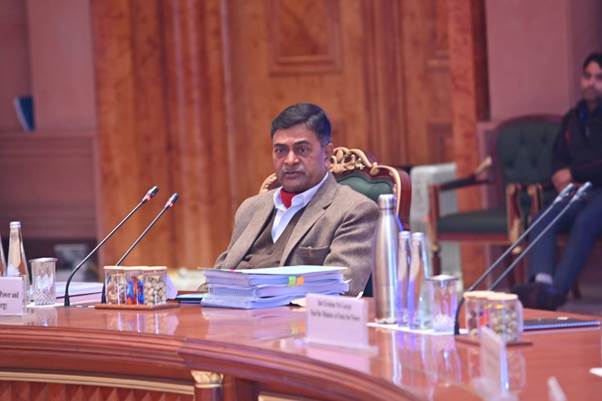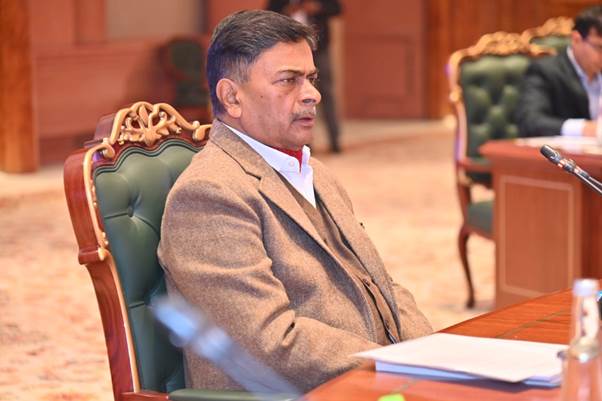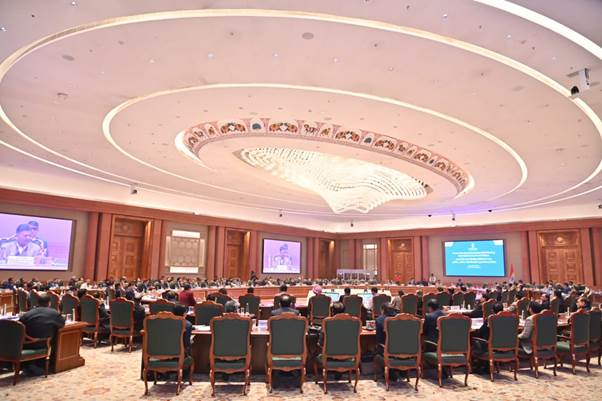
The Review, Planning and Monitoring (RPM) Meeting of Power Sector, with Power / Energy Secretaries and CMDs / MDs of all discoms of all states, is being held under the chairpersonship of Union Minister for Power and New & Renewable Energy Shri R. K. Singh, in New Delhi, on January 18 & 19, 2024. Union Power Secretary, Union New & Renewable Energy Secretary, Additional Chief Secretaries / Secretaries / Principal Secretaries (Power/ Energy) of States, CMDs of State Power Utilities and officials from Central Public Sector Enterprises are participating in the meeting.
Addressing the power sector stakeholders in his opening address, the Union Minister for Power and New & Renewable Energy underlined the importance of making loadshedding a thing of the past. “I do not accept a future where India continues to be a developing country. The difference between this future and that of a developed country is very simple: there is no loadshedding in a developed country, every discom has money to buy power, people’s rights are respected and disruption to power happens once in 20 – 25 years. Hence, loadshedding will be penalized, it is an insult to the people. You have to add capacity, sign PPAs and ensure resource adequacy. You have to become more efficient.” The Minister pointed out that while billing efficiency has gone up, collection efficiency remains stuck at 92.7%.

Shri Singh observed how the power sector has come a long way. “The average daily availability of power in rural areas has gone up from 12.5 hours in 2015-16 to about 21 hours now, and in urban areas from around 20-21 hours to 23.8 hours. Energy shortage has come down from 4.5% in 2014 to less than 1% today. We have reduced the AT&C losses of discoms from 27% in 2015-16 to 15.41%. People do not see generators now. In energy transition is concerned too, we are way ahead.” So, we have come a long way, but we still have not arrived, added the Minister. “The ACS-ARR gap has gone up from 15 paise to around 45 paise, which is a cause of some concern. Load shedding still happens in some states. Load shedding is going to be history,” the minister said.
“We have to transition fast and also ensure enough electricity for our growth”
The Minister told the gathering that the energy demand of the nation is growing rapidly and that capacities will have to be added in accordance with it. “The world is evolving in ways which are challenging. After 2030, it will be difficult to install thermal capacity. So, we have to transition fast and also ensure that we will have enough electricity for our growth, since our country is going to continue growing at 7.5%-plus for the next three decades. In 2030, our peak demand is going to go up from 243 GW today to 366 GW. Our established capacity has to go up to 900 GW, from about 427 GW today.”

“There shall be no compromise on viability of the sector”
Noting that the need to add capacity to meet growing energy requires investments, the Minister said that there shall be no compromise on viability of the sector. “If discoms are not viable, investments will not come, capacities will not be set up, we will not have energy for our growth, we will not be able to pay for electricity, and then, India will never become a developed country.”
The Minister recalled that there was a time when discoms did not have money to change transformers, since tariff was not cost-reflective, partly because of their inefficiency and partly because of politicization. “What we have set out to do is to depoliticize the system. If a state government wants to give electricity free, but then the subsidy will have to be paid for by the state government. We have said that consumers have rights to 24*7 electricity and that if there is any gratuitous loadshedding, then penalties have to be levied and compensation has to be given.”

“Power regulators or discoms found to be violating Electricity Act will be prosecuted, we are not going to stop till we make this system viable”
The Minister asked the States to follow the laws and various rules in order to ensure the viability of the power sector. “Otherwise, you will not get any power from the Centre, you will not get any loan from PFC or REC. If there is any instance of tariff not being up-to-date, tariff not being cost-reflective, or subsidy not being paid, requisite action under the law will be taken. And because we have laid down all these provisions in the law, the concerned people will be prosecuted.” We are not going to stop till we make this system viable, till we make India a developed country, said the Minister.
Addressing the meeting, Union Power Secretary Shri Pankaj Agarwal emphasized that some DISCOMs have not made much progress in taking up Loss Reduction works as well as Smart Metering works under Revamped Distribution Sector Scheme. He said that in case of inability on part of any DISCOM to fully utilize the gross budgetary support released to it, the same may be informed to Ministry well in advance, for allocating the unutilized funds to some other progressive DISCOMs.
Shri Agarwal informed that under Pradhan Mantri Janjati Adivasi Nyaya-Maha Abhiyan (PM-JANMAN), Ministry of Power has sanctioned electrification of 87,457 Particularly Vulnerable Tribal Groups households in 7,090 habitations; as on date, electrification of 10,013 PVTG households has been achieved. The Secretary advised states/UTs to make best efforts to supply 24×7 hours of supply to both urban and rural areas without any discrimination
Union New & Renewable Energy Secretary, Shri Bhupinder Singh Bhalla said Government of India has set ambitious goals of installing 500 GW non-fossil electricity capacity by 2030 and that we have already undertaken significant strides in this direction. “As of December 31, 2023, we have installed an impressive 187.5 GW capacity from non-fossil fuel sources. This accounts for a significant 44% of our total installed generation capacity. Measures like the competitive bidding framework, the concessions on transmission charges, demand creation measures and various incentive programmes have attracted private investments and enabled capacity addition.”
The Secretary said that the National Green Hydrogen Mission is set to play a transformative role, and states are encouraged to undertake facilitative actions to complement the Mission activities. “The development of dedicated green hydrogen policies by various states is a promising step towards building a robust ecosystem. Recent tenders for incentives for Green Hydrogen production and electrolyser manufacturing have yielded a very positive response from the industry. We request states to facilitate these projects.”
The two-day RPM meeting will discuss matters pertaining to distribution, R&R, rooftop solar, green hydrogen, green appliances, PM KUSUM, Rights of Consumer Rules, Stage-wise review for Projects planned for up to 2029-30, Viability of DISCOMs, state-wise review of Progress under RDSS, state-wise stability of power supply and state-wise detail of steps taken to meet the Demand and Resource adequacy, among others.

***
PIB DELHI | Alok Mishra / Dheep Joy Mampilly

